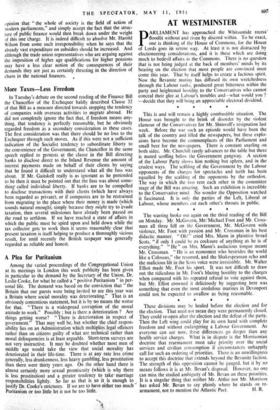More Taxes—Less Freedom
In Tuesday's debate on the second reading of the Finance Bill the Chancellor of the Exchequer baldly described Clause 32 of that Bill as a measure directed towards stopping the tendency of companies with overseas activities to migrate abroad. He did not completely ignore the fact that, if freedom means any- thing, that tendency is perfectly reasonable, but he obviously regarded freedom as a secondary consideration in these cases. The first consideration was that there should be no loss to the Exchequer through such moves. As if this were not a sufficient indication of the Socialist tendency to subordinate liberty to the convenience of the Government, the Chancellor in the same speech replied to protests at the clause in the Bill directing banks to disclose direct to the Inland Revenue the amount of interest payments made on behalf of their clients by saying that he found it difficult to understand what all the fuss was about. If Mr. Gaitskell really is as ignorant as he pretended to be then it must be pointed out that the fuss was about some- thing' called individual liberty. - If banks are to be compelled to disclose transactions with their clients (which have always been regarded as private), or if companies are to be restrained from migrating to the place where their money is made (which sounds natural enough), simply because they might try to 'evade taxation, then several milestones have already been passed on the road to serfdom. If we have reached a state of affairs in which the public must be spied upon and held down while the tax collector gets*to work then it seems reasonably clear that present taxation is itself helping to produce a thoroughly vicious result, for until recently the British taxpayer was generally regarded as reliable and honest.


































 Previous page
Previous page